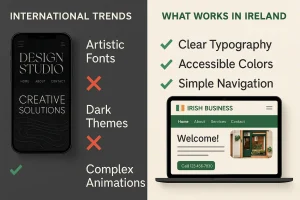Taking Business Further in 2025
A great-looking website alone isn’t enough to win customers. Equally, search engine optimisation (SEO) without a user-friendly, professional site will limit your results. To stand out in Google, convert visitors into customers, and build trust, you need both web design and SEO working together from day one.
Why Web Design and SEO Must Work Together
Your website is often the first point of contact with potential customers. It needs to impress visually, deliver your key message clearly, and be easy to use on any device. At the same time, you must build and structure in such a way that search engines can easily find, understand, and rank your content.
Without that combination, you risk one of two outcomes: a beautiful site that nobody visits, or a high-traffic site that fails to convert because of poor usability and design.
How Good Web Design Supports SEO
 Web design affects more than aesthetics. Search engines like Google take user experience into account when ranking sites, so design decisions can directly impact your SEO performance. Here are key areas where good design and SEO overlap:
Web design affects more than aesthetics. Search engines like Google take user experience into account when ranking sites, so design decisions can directly impact your SEO performance. Here are key areas where good design and SEO overlap:
1. Mobile-Friendly, Responsive Design
Over 65% of web traffic in Ireland comes from mobile devices. Google uses mobile-first indexing, meaning it assesses the mobile version of your site for ranking. A responsive design ensures your site adapts perfectly to all screen sizes, improving both rankings and user satisfaction.
2. Fast Loading Speeds
Slow websites lose visitors quickly. Google’s Core Web Vitals focus heavily on speed and responsiveness. Optimising image sizes, using efficient code, and leveraging caching systems can dramatically improve load times, leading to better rankings and more conversions.
3. Clear Navigation and Structure
A logical, easy-to-navigate menu and internal linking structure help visitors find what they need quickly. For search engines, a well-structured site with clear headings, descriptive URLs, and organised content improves crawlability and indexation.
4. Accessible and Inclusive Design
Accessible websites not only meet legal requirements under EU and Irish accessibility laws but also improve SEO. Features like descriptive alt text, keyboard navigation, and readable font sizes make your site usable by everyone, including those with disabilities.
5. Engaging Visuals and Content Layout
Well-placed imagery, video, and call-to-action buttons guide users through your site, increasing dwell time and reducing bounce rates — both positive ranking signals for Google.
Modern SEO Best Practices for 2025
SEO continues to evolve. Search engines now prioritise quality, relevance, and user experience more than ever. Here are essential strategies that work today:
1. Target the Right Keywords
Effective SEO starts with understanding what your audience is searching for. Use keyword research tools to identify both high-intent search terms (for conversions) and informational terms (for building trust and brand awareness). Avoid keyword stuffing; instead, place terms naturally in headings, meta tags, and content.
2. Optimise for Search Intent
Google’s algorithms prioritise content that matches the searcher’s intent — whether they’re looking to buy, learn, or compare. Tailor each page to meet one specific intent and ensure your content directly answers the searcher’s needs.
3. Create High-Quality, Shareable Content
Regularly publish articles, guides, and resources that solve real problems for your audience. Genuinely useful content attracts natural backlinks and social shares, boosting rankings without relying solely on paid advertising.
4. Use Structured Data (Schema Markup)
Structured data helps search engines better understand your site’s content and can enhance your listings with rich snippets — such as star ratings, event dates, or product details — directly in search results.
5. Optimise Visuals for SEO
Every image should have descriptive file names, accurate alt text, and compressed file sizes to load quickly. One should embed video content with relevant captions and metadata to improve accessibility and search visibility.
6. Build Local SEO Signals
For Irish businesses, local SEO is crucial. Ensure your business details are consistent across your website, Google Business Profile, and online directories. Use local keywords (e.g., “web design in Galway”) and encourage customers to leave reviews.
7. Improve Core Web Vitals
Core Web Vitals — Largest Contentful Paint (LCP), First Input Delay (FID), and Cumulative Layout Shift (CLS) — measure speed, interactivity, and visual stability. Meeting Google’s thresholds for these metrics can directly impact rankings.
Combining Design and SEO for Maximum Impact
When you design your website with SEO principles built in from the start, you create a solid foundation for long-term success. Visitors find your site easily, enjoy a smooth browsing experience, and are more likely to contact you, book a service, or make a purchase.
On the other hand, retrofitting SEO after launch can be expensive and less effective. That’s why professional web designers and SEOs should plan their strategy together from the outset.
Getting Started
If your business website isn’t bringing in the traffic, leads, or sales you expect, it may be time for a full review of both its design and SEO strategy. By applying modern best practices — from mobile optimisation and structured data to local SEO and fast-loading, accessible design — you can create a website that ranks well and works hard for your business 24/7.
For expert help with web design and SEO in Ireland, contact us to arrange a consultation. We can audit your current website, identify opportunities, and build a strategy that delivers measurable results.







